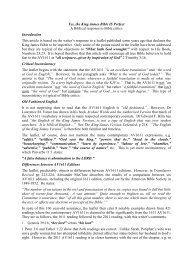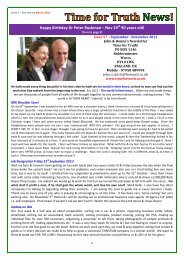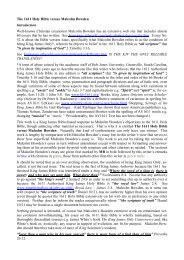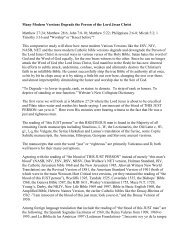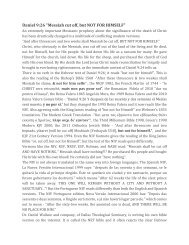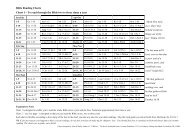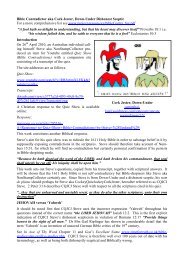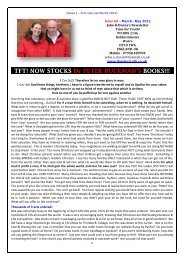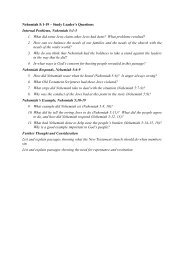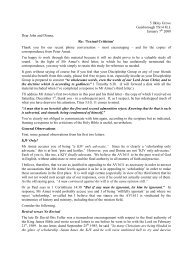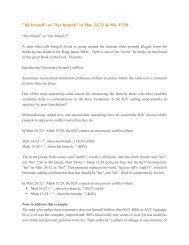A Grievous Wolf - Time for Truth
A Grievous Wolf - Time for Truth
A Grievous Wolf - Time for Truth
You also want an ePaper? Increase the reach of your titles
YUMPU automatically turns print PDFs into web optimized ePapers that Google loves.
29<br />
“Manuscript 61 was supposed to have been written between 1519 and 1522; the question becomes us,<br />
“FROM WHAT?” Not from Ximenes’s Polyglot - his wasn’t out yet. Not from Erasmus, <strong>for</strong> it doesn’t<br />
match his “Greek” in many places. The literal affinities of Manuscript 61 are with the SYRIAC (Acts<br />
11:26), and that version WAS NOT KNOWN IN EUROPE UNTIL 1552 (Moses Mardin).”<br />
The manuscript to which <strong>Grievous</strong> <strong>Wolf</strong> refers clearly cannot have been the <strong>for</strong>gery that he tries to imply<br />
that it is. He himself is the <strong>for</strong>ger, like the “many, which corrupt the word of God:” 2 Corinthians<br />
2:17, from Paul’s day down to this.<br />
27. How can anyone explain the grammatical error in the original 1611 KJV in Isa 6:2 where the translators<br />
made a rare grammatical error by using the incorrect plural <strong>for</strong>m of “seraphims” rather than<br />
“seraphim”? Was this error inspired by God?<br />
<strong>Wolf</strong>’s question is quite simply answered on this site, www.kjvtoday.com/home/seraphims-orseraphim-in-isaiah-62-et-al,<br />
showing yet again that it is not the 1611 Holy Bible but <strong>Grievous</strong> <strong>Wolf</strong> that<br />
is in error.<br />
Critics claim that “Seraphim” is already plural in Hebrew and that adding an “s” at the end is grammatically<br />
incorrect. However, “Seraphim” is a <strong>for</strong>eign word that was imported into English. Foreign<br />
rules of grammar do not apply to words that are imported into English. For example, the Latin plural<br />
<strong>for</strong>m of “factum” is “facta.” However, an appropriate plural <strong>for</strong>m of “factum” in English is “factums”<br />
(Ox<strong>for</strong>d English Dictionary). Chinese and Japanese nouns do not have plural <strong>for</strong>ms. Thus a<br />
Chinese word such as “wonton” and the Japanese word “ninja” do not need suffixes to become plural<br />
in their respective languages. However, it is common and acceptable <strong>for</strong> English speakers to add the<br />
“s” after these words to make them plural. Creating a plural <strong>for</strong>m that ends with an “s” <strong>for</strong> an imported<br />
word may be preferable since English readers may not be familiar with <strong>for</strong>eign grammar.<br />
28. Must we possess a perfectly flawless bible translation in order to call it “the word of God”? If so, how<br />
do we know “it” is perfect? If not, why do some “limit” “the word of God” to only ONE “17 th Century<br />
English” translation? Where was “the word of God” prior to 1611? Did our Pilgrim Fathers have<br />
“the word of God” when they brought the GENEVA BIBLE translation with them to North America?<br />
Was this not the Word of God to them?<br />
Note again <strong>Wolf</strong>’s incorrect use of the term “Word” instead of “word.” See Question 20.<br />
Re: “Must we possess a perfectly flawless bible translation in order to call it “the word of God”?<br />
Yes, even if it takes seven purifications, Psalm 12:6, 7. Paul gives the reason in Ephesians 4:14 “That<br />
we hence<strong>for</strong>th be no more children, tossed to and fro, and carried about with every wind of doctrine,<br />
by the sleight of men, and cunning craftiness, whereby they lie in wait to deceive;” like <strong>Grievous</strong><br />
<strong>Wolf</strong>.<br />
As David emphasises in Psalm 19:7 “The law of the LORD is perfect, converting the soul: the testimony<br />
of the LORD is sure, making wise the simple” in order to head off “the sleight of men, and<br />
cunning craftiness” of the likes of <strong>Grievous</strong> <strong>Wolf</strong>.<br />
Re: “how do we know “it” is perfect?”<br />
The 1611 Holy Bible is known to be perfect because God has not convened another English Bible translation<br />
committee since the year 1611. The 1611 Authorized Bible was the last English Bible to be<br />
translated under the direct authority of a king, according to God’s perfection principle as set out in Ecclesiastes<br />
8:4.<br />
“Where the word of a king is, there is power: and who may say unto him, What doest thou?”<br />
Benjamin Wilkinson states that the committee that produced the Revised Version of 1881 appealed<br />
twice to the Crown in order to get royal approval <strong>for</strong> their new version, as <strong>for</strong> the 1611 Bible.<br />
Queen Victoria refused each time.<br />
See Which Bible? edited by Dr David Otis Fuller, 5 th Edition, Grand Rapids International Publications,<br />
p 286, kjv.benabraham.com/html/chapter-10.html.



